Developments in SBS
Each SBS unit not otherwise featured in this issue has chosen a departmental update to share with alumni and friends of the College. Topics include fundraising proposals, current research projects and changes to curriculum.
Anthropology
The Department of Anthropology welcomed two new faculty members this past fall. Dr. Ivy Pike joins the UA from Ohio State University. Pike researches human reproductive ecology and women’s and children’s nutrition and health, especially among sub-Saharan nomads. Dr. Jennifer Roth-Gordon comes to Tucson from Brown University where she was a postdoctoral fellow in the Center for the Study of Race and Ethnicity in America. A linguist, Roth-Gordon’s research focuses on the complex relationships between language and culture, especially in Brazil.
Bureau of Applied Research in Anthropology (BARA)
BARA celebrated its 52nd anniversary on Oct. 7-10, with a conference and a reunion dinner. BARA began in 1952 with a legislative mission to monitor the well-being of Native American communities in Arizona. Through time, both the geographic coverage and the mission expanded. The anniversary celebration featured roundtables discussions on such topics as: changing Native American communities, environmental justice, bilingual education, poverty alleviation and international development, and border relations.
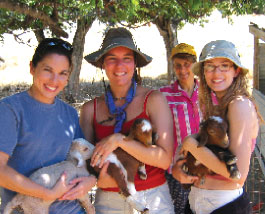
Center for Middle Eastern Studies (CMES)
K-12 teachers Denise Reilly, Lori Rubino-Hare and Wendy Wills (l-r) participated in the “Teach Cyprus” project. Photo by Greg Burch.
CMES received a Fulbright-Hays Group Projects Abroad grant to take a group of K-12 teachers to Cyprus on a curriculum-building trip during June and July of 2004. While in Cyprus, the group attended a series of lectures with scholars from Greek Cypriot and Turkish Cypriot universities, and met with other scholars and community figures. The project was aimed at the study of geography, cultural anthropology, religion, architecture, urbanization, environment, politics, conflict resolution and cross-cultural issues. Teachers returned with educational materials for their classrooms and will create lesson plans to be shared with the wider Arizona and U.S. educational community through the CMES outreach library and website.
Cognitive Science
The Cognitive Science Program is a multidisciplinary unit whose mission is to promote the interdisciplinary study of the mind through weekly colloquia, special conferences, faculty research support and student research fellowships. One of the strengths of the Program is the breadth and depth of research on human language. In keeping with this strength, the Cognitive Science Program will sponsor a large conference on language use at the University of Arizona in the spring of 2005.
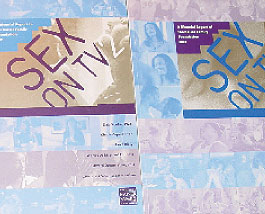 Communication
Communication
New Communication Professors Dale Kunkel and Keren Eyal have started work on a grant from the Kaiser Family Foundation entitled “Ongoing Monitoring of Media Portrayals of Sex, Sexuality and HIV.” The biennial study is a comprehensive content analysis examining the nature and extent of sexual messages in programming across broadcast and cable networks.
This fall, the Department of Communication welcomed two new professors, Keren Eyal and Dale Kunkel. Eyal has a Ph.D. in communication from the University of California-Santa Barbara and is an expert on mass media and its effects on children and adolescents. Kunkel has a Ph.D. from the University of Southern California and also has expertise on mass media content and its effects on young people, as well as media policy.
Geography and Regional Development
Geographic Information Systems (GIS) is one of the three most rapidly growing areas of science and technology, according to the Department of Labor. This year, GRD has expanded its existing resources in GIS through two new hires, Keiron Bailey and Sarah Elwood, and through a new research laboratory. Bailey’s research is on “structured public involvement” in geographic decision-making, a term that reflects the need to have an informed citizenry participate in decisions that affect everything from environmental quality and building design to facility location. Elwood’s work concentrates on disadvantaged urban communities, in particular on how they can use the mapping and analysis functions of GIS to address neighborhood problems, including environmental contamination, crime and housing deterioration.
Journalism
Students can obtain reporting experience in other nations through the new interdisciplinary International Journalism Program. During the first class in spring 2004, students produced a series of stories and photographs on political and economic issues in Chile, which ran in the Tucson Citizen. Courses are taught by award-winning journalists who have produced reports on Latin America and the Middle East for major news organizations, including The New York Times Magazine and National Public Radio.
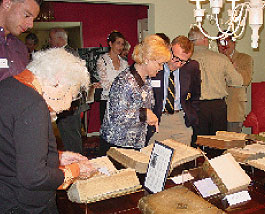 Late Medieval and Reformation Studies
Late Medieval and Reformation Studies
Guests peruse the sixteenth- and seventeenth-century volumes from the Oberman Research Collection at the November fundraiser, which was held at the home of Dr. and Mrs. George Stavros. Photo by Lori Harwood.
The Division for Late Medieval and Reformation Studies continues its campaign to endow the Heiko A. Oberman Chair in Late Medieval and Reformation History, which will bring Oberman’s vast, personal research library to the University of Arizona Libraries. As part of this effort, the Division cooperated with the International Consular Corps in Phoenix to prepare a fundraising reception in November. The Division’s recent good news is that an anonymous donor will match gifts to the Oberman Library/Chair made between Dec. 1, 2004, and Dec. 31, 2006, to an aggregate maximum of $300,000.
Latin American Studies
The Center for Latin American Studies hopes to complete fundraising for the Latin American Studies Endowment Fund and the Edward J. Williams Research Scholarship this spring. The fund will provide annual summer research scholarships of $200 to $500 to undergraduate or graduate students conducting research in an area related to Williams’ academic interests: U.S.-Mexico border issues; comparative border issues relating to Mexico and Latin America; Mexican politics, public policy or contemporary Mexican history; and U.S.-Mexico relations.
Linguistics
For four weeks in June, 90 tribal people from across North America took courses in the American Indian Language Development Institute (AILDI), which is directed by Dr. Ofelia Zepeda, professor of linguistics. AILDI offers courses in Native American linguistics, language and technology, language policy and planning, and language immersion. Participants, who share a concern of language loss within their communities and tribes, find hope, strength and new knowledge to help them in their efforts to maintain language and cultural practices in their communities. In 2004, AILDI celebrated 25 years as a training institute. Students participated in the celebration and were able to mingle and learn from others involved in indigenous language and education rights.
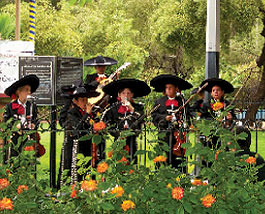 Mexican American Studies and Research Center
Mexican American Studies and Research Center
The mariachi group from Davis Bilingual Elementary School entertains the crowd at the start of the event “Testimonios Tucsonenses: Commemorating El Tratado de la Mesilla and Reclaiming the Past.” The event was the first major project of MASRC’s Public History and Cultural Studies Program. Photo by Tom Gelsinon.
Professor Raquel Rubio-Goldsmith is leading a project to establish a bi-national data set on the interaction between governmental authorities and migrants. To date, five universities in the United States and three in Mexico have joined the effort. In June of 2004, a two-day meeting of researchers took place in Tucson. Last summer, an internship program placed students with numerous federal agencies in both Homeland Security and the Department of Justice in order to unravel the detention process applied to undocumented migrants. The objective is to develop an empirical, quantitative study that will capture the voice of the undocumented throughout the process.
 Near Eastern Studies
Near Eastern Studies
Elif Shafak, a prominent novelist and writer, has joined the department this fall. The author of five novels since 1997, Shafak’s latest book, “The Saint of Incipient Insanities,” was published in English in 2004 (the earlier novels were published in Turkish, with some translated into Greek, German or English). Her interests focus on gender and women, Turkish literature and cultural identities, as well as peoples on the margins. Often interviewed in newspapers or television in Turkey, Shafak comes to us with degrees in international relations, gender and women’s studies, and political science from Middle East Technical University.
The Department of Political Science sponsors one of the longest-running Model United Nations programs in the country. This program provides a valuable learning experience by putting students in the shoes of UN delegates to debate real world issues. Students spend hours researching global issues, preparing resolutions, plotting strategy, negotiating with other delegates and working to resolve conflicts. The department has established the Arizona Model UN Endowment to provide a small but steady stream of income to ensure the continuation of this worthy program.
Psychology
The psychology department is pleased to introduce new faculty member Dr. Alan Sanfey, who directs the new Neural Decision Science Laboratory. Sanfey’s laboratory applies the technologies of functional magnetic resonance imaging and electroencephalography, as well as the study of persons who have sustained brain damage, to examine brain mechanisms underlying human judgment and decision-making. Ongoing studies in Sanfey’s laboratory are examining the role of emotion in decision-making, brain processes involved in fairness and cooperation, and memory influences on judgment.
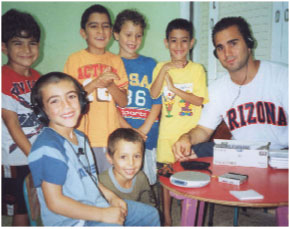
SBS Research Institute
Psychology professor Revecca Gomez does research on the way children learn in her "Tigger Lab." Gomez' research is funded by a grant from the National Science Foundation, which she obtained with support from the SBS Research Institute. — Chris Segrin, photographer
Dr. Toni Schmader, an assistant professor of psychology, was awarded a $400,000 grant from the National Institute of Mental Health. As a participant in the SBSRI summer stipend program, Schmader attended grants workshops and developed a grant proposal on a condition known as “stereotype threat.” People experience stereotype threat whenever they find themselves in a situation where they fear that they might confirm a negative stereotype about a group they belong to. Schmader hypothesizes that people experiencing stereotype threat expend cognitive resources monitoring their performance, which reduces their working memory capacity.
School of Information Resources and Library Science (SIRLS)
This fall, SIRLS welcomed its new director, Dr. Jana Bradley, who was previously director of the Library and Information Science program at Syracuse University. Leslie Kent Kunkel has also joined SIRLS in the newly-created position of academic advising coordinator. This year, Bradley will lead the school’s accreditation review process, which will involve collaborative planning for the school’s future among faculty, students, alumni and employers. Kunkel will lead new school initiatives in implementing student portfolios, expanding internships and extending development activities.
Sociology
The sociology department welcomed Dr. Lane Kenworthy to its faculty this past fall. Kenworthy received his Ph.D. from the University of Wisconsin-Madison, and he came to the University of Arizona from Emory University, where he was an assistant professor. Kenworthy’s research focuses on the causes and consequences of social inequality within and between countries, and he will be teaching courses on global inequality, political sociology and other topics. He brings a truly international and comparative perspective to the sociology department.
Southwest Center
The Southwest Center is sponsoring the making of a documentary film on Navajo textiles. The film, “Swept Under the Rug,” examines the relationship among Navajo weavers, native cultures and the global market economy. By forefronting Navajo voices, the film repositions Navajo weavers and wool growers within the context of shifting notions of free trade and globalization, the role of women in post-industrial domestic spheres, and the cultural commodities of the “vanishing Indian.” The project has initial support from the Arizona Humanities Council. It is inspired by the 2002 book, “Swept Under the Rug: A Hidden History of Navajo Weaving,” by Kathy M’Closkey, and published in the Southwest Center Series by the University of New Mexico Press.
Southwest Institute for Research on Women (SIROW)
Dr. Sally Stevens is the new director of SIROW. Stevens has conducted large-scale process and outcome research studies in the area of health disparities, substance abuse, HIV and other infectious diseases, education, and mental health issues. Stevens’ research has addressed special populations, including women and their children, and adolescents. Much of her work has focused on at-risk, Mexican-origin Hispanics and American Indians living in southwestern United States and has examined the cultural and gender issues applicable to these racial-ethnic groups.
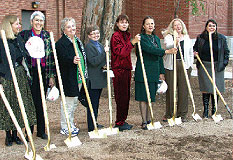 Women's Studies
Women's Studies
The Women’s Plaza of Honor groundbreaking ceremony on Dec. 8, 2004. (Broyles-González is third from the right.)
Dr. Yolanda Broyles-González, the new head of Women’s Studies, was previously a professor of Chicana and Chicano Studies and German Studies at the University of California, Santa Barbara. She was among the first women of color to receive a doctorate degree from Stanford University. In 1996, Broyles-González was honored with the lifetime achievement Distinguished Scholar Award from the National Association for Chicana & Chicano Studies. The focus of her research and teaching in Chicano Studies is popular culture, gender, oral tradition, and the popular performance genres of the US-Mexico borderlands, of which she is a native.
SBS Welcomes Planning
The Planning Degree Program has now joined the College of Social and Behavioral Sciences as part of the Department of Geography and Regional Development. The Program, currently comprised of four faculty members, offers the master’s degree in planning. The Program had previously been a part of the College of Architecture, Planning and Landscape Architecture.
In its new home in Geography and Regional Development, Planning has an opportunity to grow and to foster enhanced connections to other social sciences in the College. It is hoped that the move to the College will improve the Program’s ability to train students for grappling with Arizona’s rapid population growth and its associated social, demographic, infrastructural and environmental consequences. J.P. Jones, head of the Department of Geography and Regional Development, said that the Planning Program would be a natural fit in the department.
![]()
For more information, contact Lori Harwood at 520-626-3846 • Webmaster